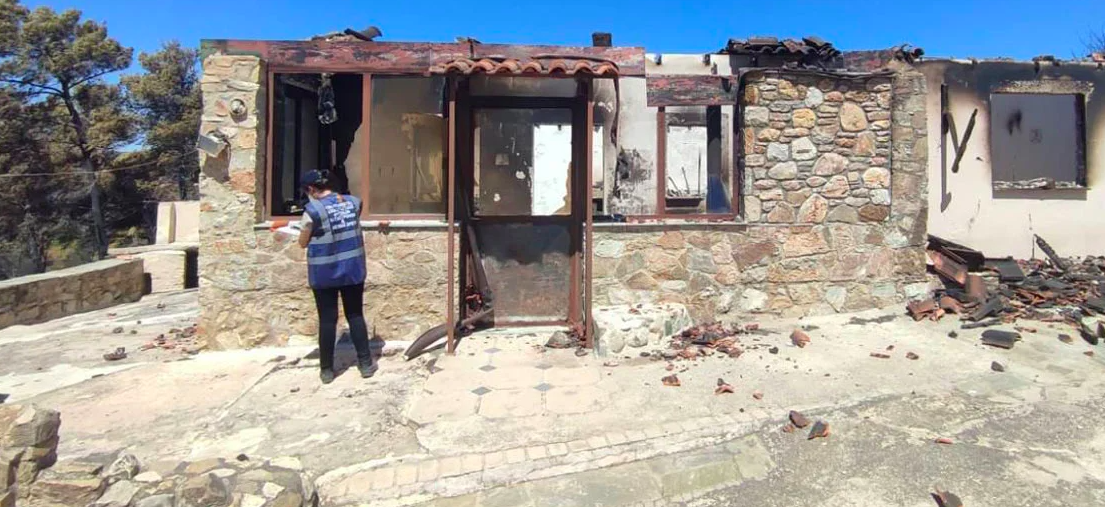The Ministry of Climate Crisis and Civil Protection, in collaboration with all relevant Ministries, is activating the framework of state aid to support the areas of Attica affected by the August 11, 2024, fire. Some of these measures also apply to other areas impacted by fires during the summer of 2024.
From the outset, personnel from the General Secretariat for the Restoration of Natural Disasters and State Aid of the Ministry of Climate Crisis and Civil Protection have been present in the affected areas, conducting inspections and assessments. Necessary documents are immediately being sent to local government organizations to inform them of the required actions and procedures.
The state aid measures, initiated through collaboration between the Ministries of Climate Crisis and Civil Protection, National Economy and Finance, Interior, Labor and Social Insurance, Social Cohesion and Family, and Agricultural Development and Food, as well as the Independent Authority for Public Revenue, for the affected areas include:
- Initial Aid for Housing Assistance:
- In the coming days, the platform arogi.gov.gr will be activated for Attica so that fire-affected citizens and businesses can apply for initial aid for housing assistance for damaged buildings. The aid will be provided after necessary verifications. Eligible for the assistance are owners, either in full or in part, of buildings damaged by the fires, which have been classified by the relevant services of the General Secretariat for the Restoration of Natural Disasters and State Aid as unsafe for use (“red”) or temporarily unsuitable for use (“yellow”), with the initial aid amounting to €10,000 or €5,000, respectively.
- Housing Assistance for Individuals and Legal Entities for Building Restoration:
- Following the completion of inspections by the services of the General Secretariat for the Restoration of Natural Disasters and State Aid, the affected areas will be delineated, and housing assistance will be provided for the repair/reconstruction of the buildings. This housing assistance consists of a free state grant (80%) and an interest-free loan (20%) guaranteed by the Greek government, granted to owners of affected buildings, up to a maximum of 150 square meters of the total area of their properties, for restoration purposes (repair or reconstruction, depending on the damage).
- Rental or Co-habitation Subsidy:
- Following the delineation of the affected areas, a rental or co-habitation subsidy will be provided to cover the costs of temporary housing for permanent residents whose homes were damaged by the fires. The subsidy ranges from €300 to €500, depending on various factors. Applicants, once the relevant platform is activated in a few days, can submit applications for temporary housing with a rental or co-habitation subsidy either through gov.gr, selecting the category “Citizen and Daily Life” and the subcategory “Natural Disasters,” or directly at arogi.services.gov.gr.
- Initial Aid Against State Aid for Affected Businesses:
- Through the platform arogi.gov.gr, which will be activated in the coming days for Attica, initial aid will be granted against a subsidy to address damage to affected businesses and non-profit organizations, depending on the extent of the damage. The amount of initial aid is €2,000 for medium-range damage and €4,000 for extensive damage to their assets. The payment of the initial aid will be made after cross-checking the applicants’ details with the applications of affected businesses submitted to the Region for damage assessment by the state aid committees.
- Advance Payment Against State Aid for Affected Businesses:
- An advance payment against the total subsidy will be granted to affected businesses and non-profit organizations following the granting of the initial aid, following the prescribed procedures so that part of the aid is paid shortly after the natural disaster. The advance payment is granted following the damage assessment carried out by the state aid committees of the Region, gradually, depending on the progress of the committees’ work.
- State Aid for Affected Businesses:
- After the payment of the initial aid and advance payment, the final subsidy amount will be granted to affected businesses, covering part of the assessed damage to the business’s assets, such as machinery, raw materials, goods, and destroyed vehicles. The final subsidy will be offset against the granted initial aid and advance payment. In collaboration with the Regions, which form the state aid committees, the process of damage assessment in businesses is promoted so that, once the assessment process is completed, the final subsidy amount is granted, considering all relevant data.
- State Financial Assistance for Agricultural Holdings:
- For agricultural holdings, the State Financial Assistance (SFA) regulation of the Ministry of Agricultural Development and Food is in force, implemented by ELGA with its correspondents in each Municipality of the affected areas, and concerns, among other things, plant production means and equipment in agricultural holdings. In areas not covered by the SFA regulation, the state aid framework has been activated in cooperation with the Region.
- Compensation for Household’s Immediate Needs and Household Goods:
- Affected households will receive financial assistance, in cooperation with the Municipalities, depending on the damage assessment. Specifically, compensation will be provided to affected households as follows: (a) financial assistance of €600 for each household whose primary residence was affected, to cover immediate needs, with an additional amount for large families and people with special needs; (b) financial assistance of up to €6,000 per household for the repair or replacement of household goods in the affected primary residence, with the assistance limited to 50% for secondary residences; and (c) financial assistance of €4,500 for individuals who suffered a disability (67%) due to injury in the natural disaster. The Municipalities will take into account the inspection data from the teams of the General Directorate for the Restoration of the Impact of Natural Disasters (GDRAFD) conducted in the area.
- Suspension of Tax Obligations:
- In areas declared in a state of emergency due to fires, the payment of outstanding and confirmed tax obligations will be suspended for six months for both businesses and individuals affected. Specifically, the suspension targets businesses certified as affected with a relevant certificate from the Region and included in the state aid framework for affected businesses. Similarly, the suspension applies to individuals certified to have suffered damage to their homes within the housing assistance and household goods compensation scheme.
- Facilitation in Guaranteed Minimum Income and Housing Allowance:
- The validity of approval decisions for the Guaranteed Minimum Income (GMI) and the housing allowance for beneficiaries residing in the affected areas of Attica is extended: (a) by three (3) months if a new application is required in August 2024 and (b) by two (2) months if a new application is required in September 2024. The extension is granted provided that (a) no new application for the continuation of the GMI had been submitted in August and (b) the beneficiaries, according to their approval decisions, reside in the affected areas of Attica.
- Suspension of Forced Execution Acts:
- The suspension of all forced execution acts on the movable or immovable property of those affected by the fire is possible for six months. The suspension specifically targets affected businesses and individuals whose homes have been damaged. For individuals and legal entities eligible for this measure, the conduct of all forced execution acts on their movable or immovable property, except for alimony claims, is suspended for six months. The suspension especially covers auctions, seizures, evictions, and personal detentions. During the six-month period, the deadlines for exercising legal remedies and aids related to pending forced execution proceedings are also suspended. The suspension applies to businesses certified as affected with a relevant certificate from the Region and included in the state aid framework for affected businesses, as well as individuals certified to have suffered damage to their homes within the housing assistance and household goods compensation scheme.
- Three-Year Exemption from ENFIA (Property Tax):
- Buildings and their associated land, located in areas declared in a state of emergency due to fires and classified as dangerous or temporarily unsuitable for use, may be exempt from ENFIA for three years, provided that during this time, ownership or any real right in the property belongs to the tax obligor of that year.
- Adjustment and Suspension of Social Security Contributions:
- Following the delineation of the affected areas, businesses within the delineated areas and affected by the fires may be included in a process of adjustment and suspension of social security contributions. The suspension of social security obligations, for six months, with a corresponding adjustment process, specifically targets businesses affected by the natural disaster, certified as affected with a relevant certificate from the Region and included in the state aid framework for affected businesses.
- Suspension of Employment Contracts with Corresponding Allowance:
- A special employment support scheme is being developed for businesses in Attica affected by the fires, offering the possibility of suspending employment contracts and granting a corresponding allowance to the employees of the affected businesses for three months. Like other measures, this one specifically targets businesses certified as affected and included in the state aid framework for affected businesses.
- Emergency Funding to Local Authorities:
- In cooperation with local government organizations, emergency funding will be provided where necessary to cover damages to networks and infrastructure.
Finally, it is emphasized that the assistance provided under the state aid framework is tax-free, immune from seizure, non-transferable, and not subject to any fees or contributions. It cannot be seized or offset against confirmed debts to the public sector, social security funds, or financial institutions. The above also applies to amounts paid by insurance companies for damages from natural disasters.
Ask me anything
Explore related questions





